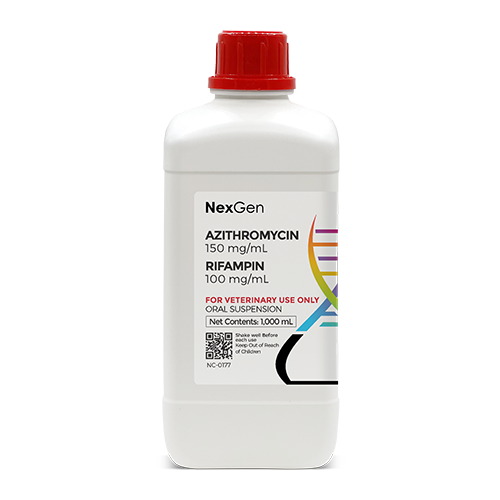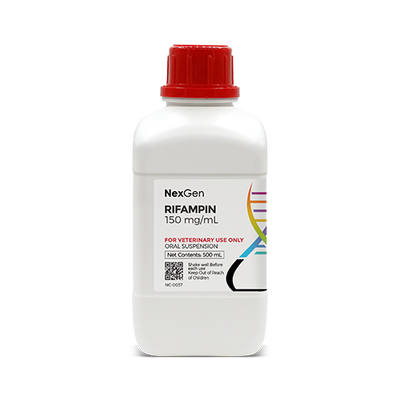
Azithromycin 150 mg/mL + Rifampin 100 mg/mL, Oral Suspension, 1000mL
Login for pricing
- Brand
- Mixlab
- SKU:
- NC-0177
- Product Type:
- Suspension
- Size:
- 1000ml
- Administration:
- Oral
Rhodococcus equi is a Gram-positive facultative intracellular pathogen that is a common cause of bronchopneumonia in foals between three weeks and five months of age. R. equi can also cause various extrapulmonary infections.1 Although R. equi is present in the environment of nearly all horse farms, clinical disease in foals is endemic in some farms and rare in others. Infections are also extremely rare in adult horses.
The R. equi bacteria are ubiquitous in soil. Inhalation of virulent R. equi is the major route of pulmonary infection in foals. Ingestion of the organism is an important route of exposure, but rarely leads to pneumonia unless a foal has multiple exposures to extremely large numbers of bacteria.1
The most common clinical manifestation of R. equi infections in foals is bronchopneumonia. Early clinical signs may only include a slight increase in respiratory rate and a mild fever.2 These clinical signs are often either missed or ignored, allowing the condition to progress. As the disease progresses, clinical signs can include:
-
Decreased appetite
-
Lethargy
-
Fever
-
Tachypnea
-
Increased effort of breathing
A wide variety of antimicrobials are effective in vitro against R. equi. However, because of the intracellular location of R. equi and its development within pyogranulomatous lesions, drugs that are effective in vitro may not be effective in vivo.3 Some retrospective data indicate that the combination of penicillin and gentamicin is ineffective, however, in some countries, this combination is still used with apparent success to treat affected foals.2
Azithromycin for Equines
Erythromycin has often been used to treat R. equi-induced bronchopneumonia in foals however, adverse effects associated with erythromycin can include environmentally modulated hyperthermia and diarrhea in foals. As a result, the use of azithromycin in treating affected foals has increased in recent years. Advantages of azithromycin include once-daily or every-other-day dosing (versus multiple daily dosing for erythromycin) and persistently high intracellular concentrations of the drug.3
Where to buy Azithromycin + Rifampin
Azithromycin + Rifampin is available in the U.S. through several pharmaceutical manufacturers and through veterinary custom compounding companies.
FOR RX ONLY: A valid prescription from a licensed veterinarian is required for dispensing this medication.
1Stieler A.L., et. al. Effects of clarithromycin, azithromycin and rifampicin on terbutaline-induced sweating in foals. Equine Vet J. 2017 Sep;49(5):624-628.
2Giguère S, et. al. Retrospective comparison of azithromycin, clarithromycin, and erythromycin for the treatment of foals with Rhodococcus equi pneumonia. J Vet Intern Med. 2004 Jul-Aug;18(4):568-73.
3Sweeney C.R., et. al. Rhodococcus equi pneumonia in 48 foals: Response to antimicrobial therapy. Vet Microbiol 14:326-329, 1987.














